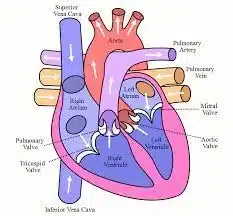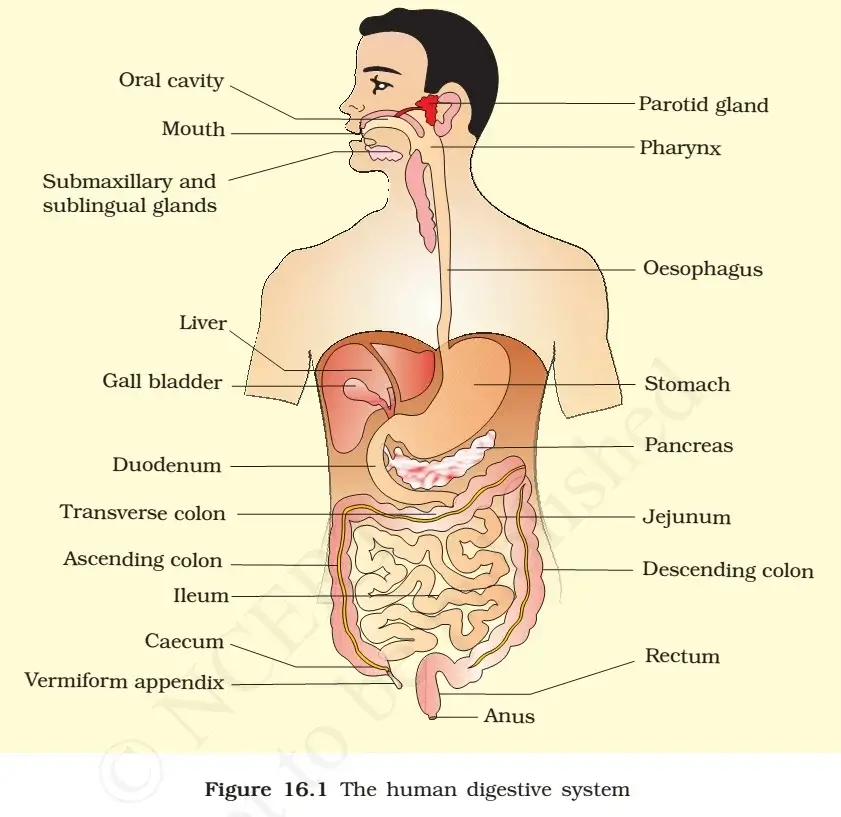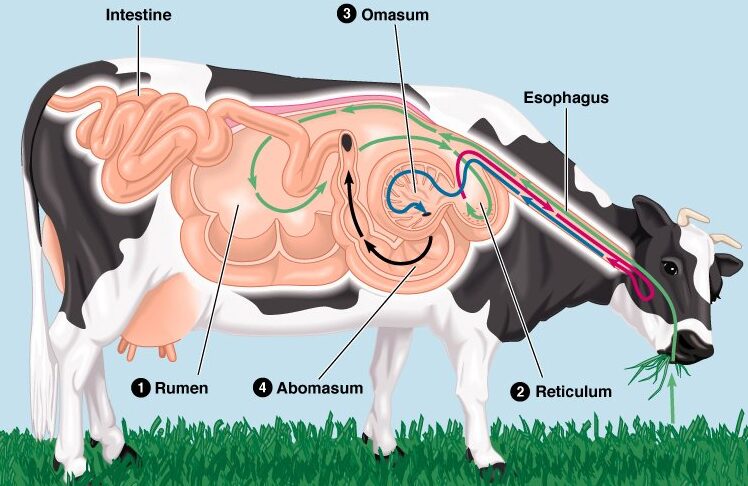Hormones
Hormones are special chemicals that travel through the bloodstream. They carry messages from the glands where they are produced to cells in different parts of the body. These chemical messages help to “turn on” or “turn off” cellular processes that control appetite, growth, stress, blood sugar, sleep cycles, sexual function etc. They are secreted by special tissues in our body through endocrine glands.
Your body uses hormones for two types of communication. The first type is communication between two endocrine glands: One gland releases a hormone, which stimulates another gland to change the levels of hormones that it’s releasing. An example of this is the communication between your pituitary gland and thyroid. Your pituitary gland releases thyroid-stimulating hormone (TSH), which triggers your thyroid gland to release its hormones, which then affect various aspects of your body.
The second type of communication is between an endocrine gland and a target organ. An example of this is when your pancreas releases insulin, which then acts on your muscles and liver to help process glucose.
Different hormones have different effects on the shape of the body. Some of these hormones work quickly to start or stop a process and some will continually work over a long period of time to perform their functions. They help in body growth, development, metabolism, sexual function, reproduction etc.
Some people are more sensitive to hormones than others. This might explain why some people suffer from premenstrual syndrome or postpartum depression, while others aren’t bothered at all by the hormonal changes of menstruation and pregnancy.
Where Do Hormones Come From?
Hormones come from endocrine glands. A gland is an organ that makes one or more substances, such as hormones, digestive juices, sweat or tears. Endocrine glands are different from other glands of the human body as they are ductless. Endocrine glands release hormones directly into your bloodstream.
These are the main hormone-producing glands in the body:
- Hypothalamus: It controls the body temperature, regulates emotions, hunger, thirst, sleep, moods and allow the production of hormones.
- Pineal: Pineal is also known as the thalamus. It produces serotonin derivatives of melatonin, which affects sleep patterns.
- Parathyroid: This gland helps in controlling the amount of calcium present in the body.
- Thymus: It helps in the production of T-cells, functioning of the adaptive immune system and maturity of the thymus.
- Thyroid: It produces hormones that affect the heart rate and how calories are burnt.
- Adrenal: This gland produces the hormones that control the sex drive, cortisol and stress hormone.
- Pituitary: It is also termed as the “master control gland,”. This is because the pituitary gland helps in controlling other glands. Moreover, it develops the hormones that trigger growth and development.
- Pancreas: This gland is involved in the production of insulin hormones, which plays a crucial role in maintaining blood sugar levels.
- Testes: In men, the testes secrete the male sex hormone, testosterone. It also produces sperm.
- Ovaries: In the female reproductive system, the ovaries release estrogen, progesterone, testosterone and other female sex hormones.
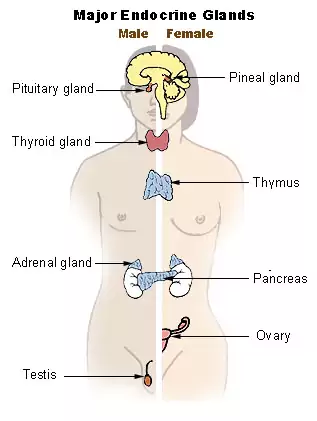
Hormones and their functions
| Where the hormone is produced | Hormone(s) secreted | Hormone function |
|---|---|---|
| Adrenal glands | Aldosterone | Regulates salt, water balance, and blood pressure |
| Adrenal glands | Corticosteroid | Controls key functions in the body; acts as an anti-inflammatory; maintains blood sugar levels, blood pressure, and muscle strength; regulates salt and water balance |
| Pituitary gland | Antidiuretic hormone (vasopressin) | Affects water retention in kidneys; controls blood pressure |
| Pituitary gland | Adrenocorticotropic hormone (ACTH) | Controls production of sex hormones (estrogen in women and testosterone in men) and the production of eggs in women and sperm in men. |
| Pituitary gland | Growth hormone (GH) | Affects growth and development; stimulates protein production; affects fat distribution |
| Pituitary gland | Luteinizing hormone (LH) and follicle-stimulating hormone (FSH) | Controls the production of sex hormones (estrogen in women and testosterone in men) and the production of eggs in women and sperm in men. |
| Pituitary gland | Oxytocin | Controls the production of sex hormones (estrogen in women and testosterone in men) and the production of eggs in women and sperm in men |
| Pituitary gland | Prolactin | Initiates and maintains milk production in breasts; impacts sex hormone levels |
| Pituitary gland | Thyroid-stimulating hormone (TSH) | Stimulates the production and secretion of thyroid hormones |
| Kidneys | Renin and angiotensin | Controls blood pressure, both directly and also by regulating aldosterone production from the adrenal glands |
| Kidneys | Erythropoietin | Affects red blood cell (RBC) production |
| Pancreas | Glucagon | Raises blood sugar levels |
| Pancreas | Insulin | Lowers blood sugar levels; stimulates metabolism of glucose, protein, and fat |
| Ovaries | Estrogen | Stimulates contraction of the uterus and milk ducts in the breast |
| Ovaries | Progesterone | Stimulates the lining of the uterus for fertilization; prepares the breasts for milk production |
| Parathyroid glands | Parathyroid hormone (PTH) | Most important regulator of blood calcium levels |
| Thyroid gland | Thyroid hormone | Controls metabolism; also affects growth, maturation, nervous system activity, and metabolism |
| Adrenal glands | Epinephrine | Increases heart rate, oxygen intake, and blood flow |
| Adrenal glands | Norepinephrine | Maintains blood pressure |
| Testes (testicles) | Testosterone | Develop and maintain male sexual characteristics and maturation |
| Pineal gland | Melatonin | Releases melatonin during night hours to help with sleep |
| Hypothalamus | Gonadotropin-releasing hormone (GnRH) | Regulates growth hormone release in the pituitary gland |
| Hypothalamus | Growth hormone-releasing hormone (GHRH) | Thyrotropin-releasing hormone (TRH) |
| Hypothalamus | Corticotropin-releasing hormone (CRH) | Regulates LH/FSH production in the pituitary gland |
| Hypothalamus | Affects the development of female sexual characteristics and reproductive development, important for functioning of uterus and breasts; also protects bone health | Regulates adrenocorticotropin release in the pituitary gland |
| Thymus | Humoral factors | Helps develop the lymphoid system |
Important Hormones
Estrogen
- Estrogen is a female sex hormone.
- It is produced mainly in the ovaries, but your adrenal glands produce some, as do fat cells.
- Estrogen is a key hormone for women in particular because it is responsible for menstruation, menopause, reproduction, sex drive, and even bone and blood health. One of the hormones it works in concert with is progesterone, another female sex hormone. The two need to be in balance for good health.
- While a woman’s estrogen levels will rise and fall naturally throughout her life, there are things to look out for to see if there is an imbalance that can be treated.
- High estrogen levels increase risks for breast and uterine cancer. Too much estrogen can also lead to depression or general moodiness. Low levels of estrogen can cause skin issues like acne, lesions, and thinning skin. It is also linked to hair loss.
- Of course, menopause is caused in part by a lack of estrogen. So hot flashes and night sweats, sleep issues, decreased sex drive, and other menopausal symptoms can be related to low estrogen levels.
Testosterone
- It is a male sex hormone. It is an anabolic steroid by nature which helps in building body muscles.
- In males, it plays an important role in the development of male reproductive tissues; testes and prostate.
- It also promotes secondary sexual characteristics like increasing the mass of muscles and bones, growth of body hair etc.
- If testosterone is secreted insufficient in men then it may lead to abnormalities including frailty and bone loss.
- A key male sex hormone, testosterone is primarily produced in the testicles. Women also produce lower levels of testosterone in the ovaries and adrenal glands. Testosterone is responsible for regulating sex drive, muscle strength, fat distribution, bone mass, and the production of red blood cells.
- Low levels of testosterone can result in infertility due to low sperm production, reduced sex drive, erectile dysfunction, body hair loss, loss of muscle mass, decreased strength, and swelling in the breast tissue.
- Too much testosterone in men can prematurely trigger puberty (before age 9). It can also cause aggression, irritability and acne. Additionally, it can exacerbate sleep apnea in those who have it already.
- In women, too much testosterone can cause acne, thinning hair on the head, more body and facial hair, low libido, irregular periods and reduction in breast size.
Insulin
- This hormone is released by the pancreas, a leaf-like gland located in the abdominal cavity behind the stomach.
- It allows the body to use glucose or sugar from carbohydrates in the food for energy or to store glucose for future use. It helps in keeping blood sugar levels from getting too high i.e. hyperglycemia or too low i.e. hypoglycemia.
- Produced by the pancreas, insulin is responsible for converting sugar, or glucose, from the carbohydrates you ingest into energy. Or it can also help store the glucose in the liver for future use.
- If your body doesn’t generate enough insulin or if it isn’t using it well, blood sugar accumulates and can set you up for diabetes.
Cortisol
- It has been named as the “stress hormone” as it helps the body in responding to stress. It kicks in to put your body in survival mode in dangerous situations. This is done by increasing the heart rate, elevating blood sugar levels etc.
- This hormone is produced by the adrenal gland. It helps you stay healthy and energetic.
- At stressful times body secretes cortisol to cope up with the situation. High level of cortisol consistently causes ulcer, high blood pressure, anxiety, high levels of cholesterol etc.
- Low levels of cortisol also cause problems like low blood pressure, fatigue, weakness, loss of appetite. These are all symptoms of Addison’s disease.
- Humans naturally produce less cortisol at night when they sleep (and historically, this was when we faced fewer dangers), but research has shown that people who regularly work overnight shifts have higher levels of cortisol at night compared with daytime employees and a higher risk of metabolic syndrome.
Human Growth Hormone
- It is also known as somatotropin hormone. It is basically a protein hormone having 190 amino acids which are synthesised and secreted by the cells called somatotrophs in the anterior pituitary. It stimulates growth, cell reproduction cell regeneration and in boosting metabolism. It is important in human development.
- Children and adolescents produce the most growth hormone, but adults require a lower level to maintain healthy tissues, bones, and muscles.
- Children who do not produce enough growth hormone to meet physical milestones may be prescribed HGH injections. Some adults also seek to increase their levels of growth hormone because it has been said to be anti-aging and make you feel and look younger by boosting muscle tone. Levels can be naturally increased through diet, exercise, and lifestyle habits.
Serotonin
- It is a mood-boosting effect hormone or also known as nature’s feel-good chemical.
- It is associated with learning and memory, regulating sleep, digestion, regulates mood, some muscular functions etc.
- Due to the imbalance of serotonin in the body, brain does not produce enough of the hormone to regulate mood or stress level.
- Low level of serotonin causes depression, migraine, weight gain, insomnia, craving of carbohydrate etc.
- Excess level of serotonin in the body causes agitation, stage of confusion, sedation etc.
Adrenaline
- Adrenaline hormone is secreted in the medulla in the adrenal gland as well as some of the central nervous system’s neurons.
- It is also known as an emergency hormone because it initiates the quick reaction which makes the individual to think and respond quickly to the stress.
- It is for that reason that adrenaline is referred to as the “fight or flight” hormone. The release of adrenaline sends extra blood to your heart and muscles.
- It increases the metabolic rate, dilation of blood vessels going to the heart and the brain.
- During a stressful situation, adrenaline quickly releases into the blood, send impulses to the organs to create a specific response.
- Adrenaline has also been known to block pain. You may have heard about people in chaotic and dangerous situations not noticing an injury that would normally be painful. That’s because of the abundance of adrenaline in their systems. The effects of adrenaline can stick around for up to an hour.
- Prolonged continual stress can lead to the overproduction of adrenaline. The results of too much adrenaline can include high blood pressure, palpitations, rapid heartbeat, weight loss, anxiety, irritability, and dizziness.
Thyroid Hormones
- The thyroid regulates your metabolism, which means it plays a role in digestion, hunger, and your overall energy level.
- Thyroid gland basically releases two hormones Triiodothyronine (T3) and Thyroxine (T4), which helps in controlling the metabolism of our body.
- Your thyroid can make too much hormone, which is called hyperthyroidism, or it can make too little, referred to as hypothyroidism. Hypothyroidism is more common.
- When a person doesn’t have enough thyroid hormones (a common condition called hypothyroidism), it can cause symptoms such as low energy, slow heart rate, weight gain, dry skin and hair, sensitivity to cold, depression, constipation, achy joints and muscles, and irregular menstrual cycles.
- On the other end, an overabundance of thyroid hormones (hyperthyroidism) can lead to fatigue, fast heart rate, weight loss, sensitivity to heat, mood swings, diarrhea, and muscle weakness.
- There’s no real natural way to keep the thyroid hormones in check, because the most common reason is an autoimmune process.
- Sometimes that autoimmune process is triggered by stress—mental stress like breaking up with your significant other or physical stress like a severe illness or giving birth.
The feedback mechanism of Thyroid Hormone
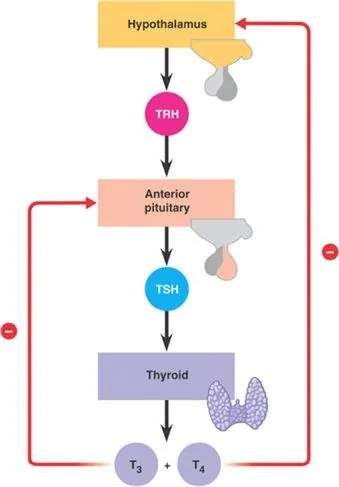
The thyroid gland produces a hormone called thyroxine, and its secretion is controlled by the Thyrotropin Releasing Hormone (TRH) from the hypothalamus and the Thyroid Stimulating Hormone (TSH) from the anterior pituitary.
When the level of thyroxine in the blood reduces, the hypothalamus stimulates the thyroxine secretion by stimulating TSH secretion. This represents a positive feedback mechanism.
If the hypothalamus continues to stimulate thyroxine production, it could result in a high level of thyroxine in the blood. This sends negative feedback to the hypothalamus to reduce or stop the TRH and TSH secretion which regulates the thyroxine level in the body. This is a negative feedback mechanism.
Prolactin
- This hormone is released by the pituitary gland after childbirth for lactation, which enables female to breastfeed.
- Levels of prolactin hormone rise during pregnancy i.e. it also plays an important role in fertility by inhibiting follicle-stimulating hormone (FSH) and gonadotropin-releasing hormone (GnRH).
Progesterone
- Progesterone hormone is produced in the ovaries, the placenta when a woman gets pregnant and the adrenal glands.
- It stimulates and regulates various functions. It plays an important role in maintaining pregnancy.
- It helps body to prepare for conception, pregnancy and regulates the monthly cycle.
- When pregnancy doesn’t occur, progesterone levels drop and menstrual cycle occurs. It also plays a role in sexual desire.
Melatonin
- Melatonin controls your sleep/wake cycles or your circadian rhythm.
- Sunlight prevents the production of melatonin, which is secreted by your pineal gland. As it gets dark at night, your body makes more melatonin and you get sleepier.
- Your computer, cell phone, and TV all reduce the amount of melatonin you produce, so either use blue-blocking glasses at night or don’t use these devices 1-2 hours before bedtime.
Know about the 4 happy hormones
Also refer:
- Human Digestive System
- Genome Editing And CRISPR-Cas9 Technology
- Top 50 Science MCQs For Competitive Exams
- Top 50 Science Questions From Previous Year UPSC Prelims
- Top 25 MCQs on Virus
- Previous Years Questions Of UPSC On Human Diseases
- Download the pdf of Important MCQs From the History Of Ancient India
- List Of Important Inscriptions In India






